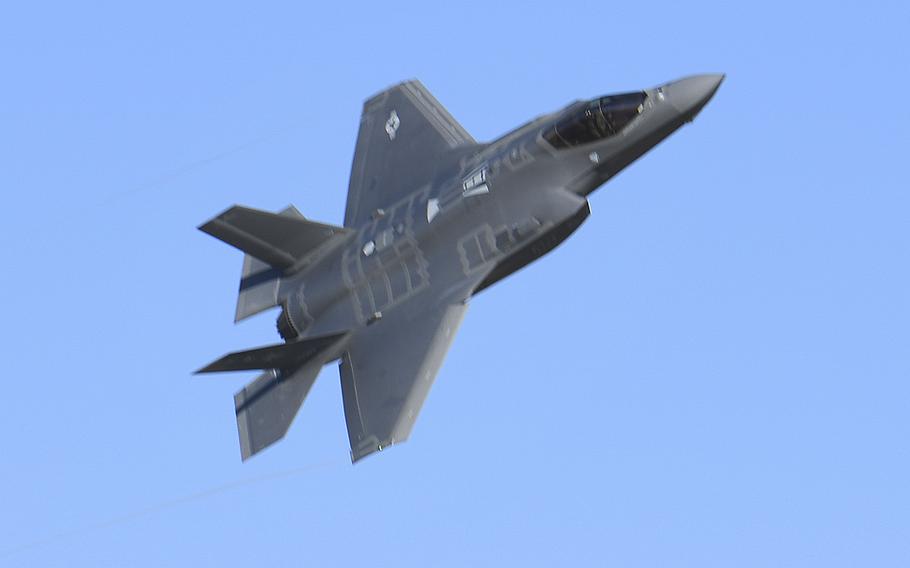
An F-35 Lightning II performs aerial maneuvers during a combat power exercise at Hill Air Force Base, Utah, Nov. 19, 2018. (James Kennedy/U.S. Air Force)
While the sight of American-made F-35s demonstrating their prowess at international air shows outside of the United States is not uncommon, their participation at Aero India 2023 last month did turn some heads.
That’s because unlike their recent performances in Australia and the United Kingdom, which fly them in partnership with the United States, India has long been a top client of Russia’s aerospace and defense industry, which furnishes about 70% of India’s air force. Yet Moscow barely showed up for the air show.
At a time when Russian supply chains have been disrupted by the Ukraine conflict and Russian defense firms are stymied by sanctions and battlefield losses, signals by Indian policymakers that they are considering F-35 purchases send an important message about New Delhi’s strategic direction.
While Indian diplomats have not been shy about defending New Delhi’s neutrality in the Ukraine crisis, Indian foreign policy and defense officials are also making clear that the status quo of India’s dependency on Russia is not one they seek to perpetuate.
Reflecting the views of prominent retired Indian generals and diplomats with close ties to the Indian government, a March 2022 report by the International Vivekananda Foundation called on New Delhi to “widen its airpower basket away from Russia” and “work towards weaning itself away from dependence on Russia for military technology” in light of the Ukraine crisis. More recently, Indian Army chief Gen. Manoj Pande indicated that a “direct fallout of the Russia-Ukraine conflict” was a realization by India that it needed to become more “self-reliant” in sourcing military equipment.
While India’s interest in the F-35 relates to its deterrence posture in the Indo-Pacific, it would not be lost on India’s partners in Moscow that U.S. allies see in the F-35’s stealth particular advantages against anti-aircraft missile batteries made in Russia.
Meanwhile, recent news reports indicate that Russian President Vladimir Putin is likely to attend the G-20 summit later this year for the first time since 2019. Putin’s renewed engagement is likely the summit’s location in India, which took over the G-20 presidency in December 2022.
A shift in Indian policy would allow the G-20 to underscore to Moscow that continued war in Ukraine comes with the price of further international isolation. But for this to happen, Indian leaders will need to be persuaded that the country has a clear path to diversifying its defense industry from Russia, which tends to provide less expensive weapons systems than its western counterparts.
The diversification of Indian aerospace and defense away from Russia will continue to be a gradual process, but apparent interest in the F-35 creates an opportunity for U.S. industry in the run-up to the September summit.
This is in part because preparations for the G-20 dialogue coincide with final deliberations in Washington on the longstanding debate of whether to upgrade the F-35 propulsion system midway through the jet’s expected life cycle or replace it altogether. Current and prospective F-35 partners, including India, are watching the issue as a barometer of the United States’ commitment to its allies and whether or not it will allow domestic industry turf battles to burden them unnecessarily.
The Air Force signaled this month after years of costly reviews and testing that it would simply upgrade the existing F135 engines instead of going with an entirely new propulsion system.
Now the ball rests squarely with Congress.
If it decides to overrule the Air Force and go ahead with the new engine, dubbed the Adaptive Engine Technology Program (AETP), this would burden the 14 nations that fly F-35s by creating multiple supply and logistical chains to maintain the engine systems of older and newer jets. It would also be a powerful disincentive for prospective buyers like India to purchase a jet in the process of a costly and arguably counterproductive transition.
Since the outbreak of the Ukraine war, the Biden administration has made clear its intention to prioritize U.S. engagement with India and show that it can be a partner for New Delhi. One way to realize this goal is to press Congress to facilitate the sale of F-35s to India as it looks for alternatives to Moscow. In the run-up to the G-20 summit, Congress can do so simply by avoiding disruptions to one of the United States’ most symbolic aerospace programs.
Pratik Chougule is an international relations researcher based in Washington, D.C. A Yale Law School graduate, he served at the U.S. State Department in the George W. Bush administration.